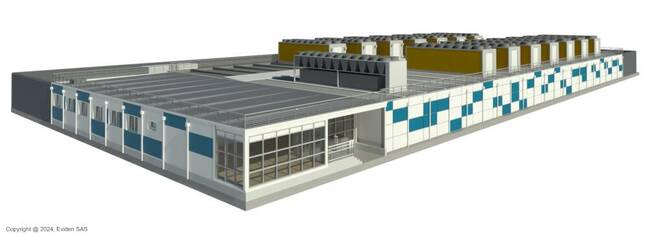Europe's First Exascale System Will Be Slotted Into Modular Containerized Datacenter

Europe's first exascale supercomputer will be delivered as a modular datacenter consisting of container units intended to allow for easier updates or replacement of single modules in future. An Early Access Program has also opened for potential applications for the upcoming system.
Jupiter, or the "Joint Undertaking Pioneer for Innovative and Transformative Exascale Research", is still is scheduled to go into operation sometime in the autumn of 2024.
The system, procured by the European High Performance Computing Joint Undertaking (EuroHPC JU) is set to be the first exascale system in Europe, capable of performing more than an exaflop, or one quintillion (billion billion) floating point operations per second, which we assume refers to double-precision floating point versus the oft-bandied "AI flops".
The Jülich Supercomputing Center (JSC), which is in charge of the project, said it is taking a novel approach for the datacenter to house Jupiter's infrastructure. It will be composed of about 50 container modules across an area of more than 2,300 square metres or roughly half the size of a football pitch, according to the JSC. Translated to American, that's just under 25,000 square feet or one half of a field for actual, real football.
Those container modules are planned to comprise 20 IT modules, 15 power feed modules and 10 logistic modules, the latter making up the lobby, workshop and warehouse spaces for the datacenter.
Racks holding Jupiter's infrastructure will be integrated into the containers along with cooling, power, networking and cabling directly on the factory floor, before delivery. This is expected to markedly speed the installation process and reduces the risk of faults only being discovered after the hardware is deployed to the customer site.
Advantages of this method include significantly shorter planning and setup times, plus reduced construction and operating costs, according to Eviden, the subsidiary of French IT giant Atos that is overseeing construction.
Unlike current architectures where dismantling an obsolete system and upgrading the datacenter to support new technology might take weeks or months, this system will allow the JSC to swap a module with another kitted out with newer hardware. The same is true for the power sub-system and the logistic area, Eviden said.
When Jupiter was first disclosed, EuroHPC said it would be based on a dynamic, modular architecture, as used with the Juwels supercomputer, which allowed that system to be upgraded in 2020 with a booster module equipped with GPUs.
Eviden claims that delivery time for Jupiter reduced by half to less than a year, while the costs have also been “cut by 3”, which we assume means reduced to one third. The project was estimated to have a total cost of €273 million ($290 million), when the contract was announced last year.
JSC Director Prof Dr Thomas Lippert claimed that Jupiter will be “perhaps the most powerful AI supercomputer in the world.”
“However, its enormous computing power comes with demands on the energy supply that no scientific datacenter in Germany has been able to meet so far,” he said. “I am pleased that the modular datacenter will now allow for such a supply infrastructure to be created very quickly, which will also offer the possibility of using the thermal energy generated during cooling to heat the Jülich campus.”
“We are extremely honored to be part of Europe’s exascale journey by leading the JUPITER manufacturing consortium and by now also delivering the data centre to host the system,” Eviden’s Global Head of HPC, AI and Quantum Emmanuel Le Roux said in a statement.
Meanwhile, in anticipation of Jupiter coming online, JSC has started the Jupiter Research and Early Access Program (JUREAP) to scope out potential applications for the new exascale system.
- DoE watchdog warns of poor maintenance at home of Frontier exascale system
- Intel drops the deets on UK's Dawn AI supercomputer
- Aurora dawns late: Half-baked entry secures second in supercomputer stakes
- Atos subsidiary Eviden scores contract win in Europe's first exascale system
JUREAP starts with a Scalability and Performance Evaluation Phase (SPEP), JSC said. During this, applications will be evaluated for their technical potential towards exascale-size simulations in collaboration with other researchers and domain scientists.
SPEP opened on 15 January and has no formal prerequisite for applicants, but the application must demonstrate a potential for large-scale scientific cases.
Participation in SPEP is required for those wishing to continue in the JUREAP program, the JSC said, and be among the early researchers utilizing Jupiter for scientific discovery. ®
From Chip War To Cloud War: The Next Frontier In Global Tech Competition
The global chip war, characterized by intense competition among nations and corporations for supremacy in semiconductor ... Read more
The High Stakes Of Tech Regulation: Security Risks And Market Dynamics
The influence of tech giants in the global economy continues to grow, raising crucial questions about how to balance sec... Read more
The Tyranny Of Instagram Interiors: Why It's Time To Break Free From Algorithm-Driven Aesthetics
Instagram has become a dominant force in shaping interior design trends, offering a seemingly endless stream of inspirat... Read more
The Data Crunch In AI: Strategies For Sustainability
Exploring solutions to the imminent exhaustion of internet data for AI training.As the artificial intelligence (AI) indu... Read more
Google Abandons Four-Year Effort To Remove Cookies From Chrome Browser
After four years of dedicated effort, Google has decided to abandon its plan to remove third-party cookies from its Chro... Read more
LinkedIn Embraces AI And Gamification To Drive User Engagement And Revenue
In an effort to tackle slowing revenue growth and enhance user engagement, LinkedIn is turning to artificial intelligenc... Read more


